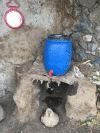WASH Upgrades for Health in Amhara (WUHA): study protocol for a cluster-randomised trial in Ethiopia
- PMID: 33619183
- PMCID: PMC7903120
- DOI: 10.1136/bmjopen-2020-039529
WASH Upgrades for Health in Amhara (WUHA): study protocol for a cluster-randomised trial in Ethiopia
Abstract
Introduction: Facial hygiene promotion and environmental improvements are central components of the global trachoma elimination strategy despite a lack of experimental evidence supporting the effectiveness of water, sanitation and hygiene (WASH) measures for reducing trachoma transmission. The objective of the WUHA (WASH Upgrades for Health in Amhara) trial is to evaluate if a comprehensive water improvement and hygiene education programme reduces the prevalence of ocular chlamydia infection in rural Africa.
Methods and analysis: Forty study clusters, each of which had received at least annual mass azithromycin distributions for the 7 years prior to the start of the study, are randomised in a 1:1 ratio to the WASH intervention arm or a delayed WASH arm. The WASH package includes a community water point, community-based hygiene promotion workers, household wash stations, household WASH education books, household soap distribution and a primary school hygiene curriculum. Educational activities emphasise face-washing and latrine use. Mass antibiotic distributions are not provided during the first 3 years but are provided annually over the final 4 years of the trial. Annual monitoring visits are conducted in each community. The primary outcome is PCR evidence of ocular chlamydia infection among children aged 0-5 years, measured in a separate random sample of children annually over 7 years. A secondary outcome is improvement of the clinical signs of trachoma between the baseline and final study visits as assessed by conjunctival photography. Laboratory workers and photo-graders are masked to treatment allocation.
Ethics and dissemination: Study protocols have been approved by human subjects review boards at the University of California, San Francisco, Emory University, the Ethiopian Food and Drug Authority, and the Ethiopian Ministry of Innovation and Technology. A data safety and monitoring committee oversees the trial. Results will be disseminated through peer-reviewed publications and presentations.
Trial registration number: (http://www.clinicaltrials.gov): NCT02754583; Pre-results.
Keywords: community child health; corneal and external diseases; epidemiology; preventive medicine; public health; tropical medicine.
© Author(s) (or their employer(s)) 2021. Re-use permitted under CC BY-NC. No commercial re-use. See rights and permissions. Published by BMJ.
Conflict of interest statement
Competing interests: None declared.
Figures
Similar articles
-
Water, sanitation, and hygiene for control of trachoma in Ethiopia (WUHA): a two-arm, parallel-group, cluster-randomised trial.Lancet Glob Health. 2022 Jan;10(1):e87-e95. doi: 10.1016/S2214-109X(21)00409-5. Lancet Glob Health. 2022. PMID: 34919861 Free PMC article. Clinical Trial.
-
Cluster randomised controlled trial of double-dose azithromycin mass drug administration, facial cleanliness and fly control measures for trachoma control in Oromia, Ethiopia: the stronger SAFE trial protocol.BMJ Open. 2024 Dec 23;14(12):e084478. doi: 10.1136/bmjopen-2024-084478. BMJ Open. 2024. PMID: 39719287 Free PMC article.
-
Associations between Water, Sanitation and Hygiene (WASH) and trachoma clustering at aggregate spatial scales, Amhara, Ethiopia.Parasit Vectors. 2019 Nov 14;12(1):540. doi: 10.1186/s13071-019-3790-3. Parasit Vectors. 2019. PMID: 31727155 Free PMC article.
-
Outcome evaluation of WASH intervention in rural households at Jawi district, Northwest Ethiopia: Mixed method design, goal based evaluation.Eval Program Plann. 2023 Jun;98:102283. doi: 10.1016/j.evalprogplan.2023.102283. Epub 2023 Apr 7. Eval Program Plann. 2023. PMID: 37084492 Review.
-
The impact of access to water supply and sanitation on the prevalence of active trachoma in Ethiopia: A systematic review and meta-analysis.PLoS Negl Trop Dis. 2021 Sep 9;15(9):e0009644. doi: 10.1371/journal.pntd.0009644. eCollection 2021 Sep. PLoS Negl Trop Dis. 2021. PMID: 34499655 Free PMC article.
Cited by
-
Water, sanitation, and hygiene for control of trachoma in Ethiopia (WUHA): a two-arm, parallel-group, cluster-randomised trial.Lancet Glob Health. 2022 Jan;10(1):e87-e95. doi: 10.1016/S2214-109X(21)00409-5. Lancet Glob Health. 2022. PMID: 34919861 Free PMC article. Clinical Trial.
-
Seroprevalence of antibodies against Chlamydia trachomatis and enteropathogens and distance to the nearest water source among young children in the Amhara Region of Ethiopia.PLoS Negl Trop Dis. 2020 Sep 2;14(9):e0008647. doi: 10.1371/journal.pntd.0008647. eCollection 2020 Sep. PLoS Negl Trop Dis. 2020. PMID: 32877398 Free PMC article.
-
Impact of a School Trachoma Program Emphasizing Facial Cleanliness and Environmental Improvement in Amhara, Ethiopia.Am J Trop Med Hyg. 2024 May 28;111(3_Suppl):114-120. doi: 10.4269/ajtmh.23-0665. Print 2024 Sep 3. Am J Trop Med Hyg. 2024. PMID: 38806020 Free PMC article.
-
Monitoring transmission intensity of trachoma with serology.Nat Commun. 2023 Jun 5;14(1):3269. doi: 10.1038/s41467-023-38940-5. Nat Commun. 2023. PMID: 37277341 Free PMC article.
-
Photographic grading to evaluate facial cleanliness and trachoma among children in Amhara region, Ethiopia.PLoS Negl Trop Dis. 2024 Jul 11;18(7):e0012257. doi: 10.1371/journal.pntd.0012257. eCollection 2024 Jul. PLoS Negl Trop Dis. 2024. PMID: 38991011 Free PMC article.
References
Publication types
MeSH terms
Associated data
Grants and funding
LinkOut - more resources
Full Text Sources
Other Literature Sources
Medical

